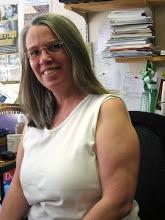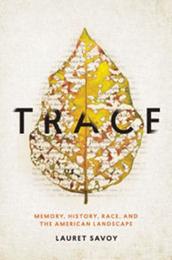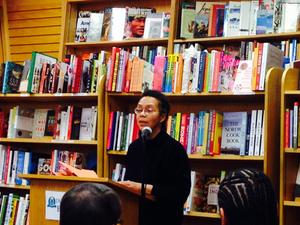"The American landscape is palimpsest. Layers upon layers of names and meanings lie beneath the official surface.... Yes, I am palimpsest, too, a place made over but trying to trace back." --Lauret Savoy, Trace: Memory, History, Race and the American Landscape
Sometimes a book finds me. I know you have your own tales to tell, but occasionally I like to share the path by which a particularly fine work made its way into my hands and, subsequently, my life.

|
|
| Joan Grenier | |
This story begins in October during the author reception at the New England Independent Booksellers Association's Fall Conference. Since I've spent a substantial part of my life passionately handselling books, I was prepared for the moment when Joan Grenier, owner of the Odyssey Bookshop in South Hadley, Mass., stopped me and said, "I want you to meet someone." That was how I was introduced to Lauret Savoy, author of Trace (Counterpoint), which has become one of my favorite reads of the year.
As we booksellers like to say: You've got to read this book! Grenier recently, and eloquently, summed up why: "The writing is poetic and thoughtful. Lauret interweaves her family history, American history and landscape in a manner I don't think I have ever seen done before. She is a mixed race woman and professor of geology and environmental studies. Her search for her ancestors leads her to many landscapes, including the borderlands of the southwest, the Grand Canyon, Washington D.C., and her birthplace in California. Inevitably the role of race in American history is part of her family's history. She details the inaccuracies, silences and omissions throughout American history, including the Black Codes in Washington D.C. and South Carolina, land grabs from Mexico and Native peoples, and the disappearance of African American towns. This is an important book as we struggle to understand and overcome the wrongs of history and the impact on our current lives."  She also called Trace "a perfect indie book. It was an Indie Next selection and booksellers from Rhode Island to California and Washington have sung its praises. I have certainly been engaging with our customers about this book. We included Trace in our holiday newsletter and have it displayed in several locations throughout our store."
She also called Trace "a perfect indie book. It was an Indie Next selection and booksellers from Rhode Island to California and Washington have sung its praises. I have certainly been engaging with our customers about this book. We included Trace in our holiday newsletter and have it displayed in several locations throughout our store."
Savoy, who teaches at Mount Holyoke College, told me she wanted her book "to cross boundaries" by exploring "how human experience and the history of the land itself have, in fragmented tellings, artificially pulled apart what cannot be disentangled: nature and 'race.' Above all, my hope is that Trace trespasses and re-members, making connections often unrecognized, such as the siting of the nation's capital and the economic motives of slavery. None of these links is coincidental. Few appear in public history. All touch us."
A bookstore aficionado from an early age, Savoy recalled: "As soon as books replaced toys as my main interests, when I was about nine years old, bookstores became havens. We had moved from California to Washington, D.C., before then and the western lands I considered home needed to be replaced in some way (even though they could never be replaced). What seemed available were eastern lands and their history. Family visits to bookstores like Brentano's felt like treasure hunts. And most times I did find treasure, whether in books on the Civil War, regional natural history or American literature. I remember hoping that the worlds of ideas held on the shelves could somehow offset disturbing media images and troubling school lessons."
She visited the Odyssey Bookshop during her first week at Mount Holyoke College: "It became another type of refuge, and Joan became a friend and supporter. Not only were books a source of ideas and inspiration, but so too were the writers themselves who came to do readings. Terry Tempest Williams, for example, spoke with me long into the night after a reading on her tour for An Unspoken Hunger. That was 1994.
 |
|
| photo: Emily Crowe | |
"I felt that, at the Odyssey, I had joined a community of readers and writers, out-of-the box thinkers. And I began to feel a necessary push. I struggled for many years to write Trace, throwing away first, second, third, fourth attempts because I didn't trust my voice or the value of what I was trying to do. Visits to the bookshop began have a painful sharpness. I feared that, unlike every author whose work filled the shelves, I would never 'be a writer.' Yes, my name is on other books, but one is more academic and two others are edited collections. What mattered was that I stop silencing and sabotaging myself. So I finally promised to stop throwing away my words. Joan was a sounding board all along the way."
She added: "And you know firsthand how supportive she was at the recent NEIBA gathering in Providence, a one-woman dynamo!" That I do.
Last month, Savoy's reading at Odyssey "was standing room only with colleagues, students and customers excited to be present," said Grenier. "Lauret gave a powerful reading and during the q&a we learned that Lauret's journey to explore this land and her family will continue with several other possible books. People are still talking about the reading and how wonderful the evening was."
I wish I'd been there, but I'm thankful that Trace found me. Sometimes great reads do that. --Robert Gray, contributing editor (column archives available at Fresh Eyes Now)

